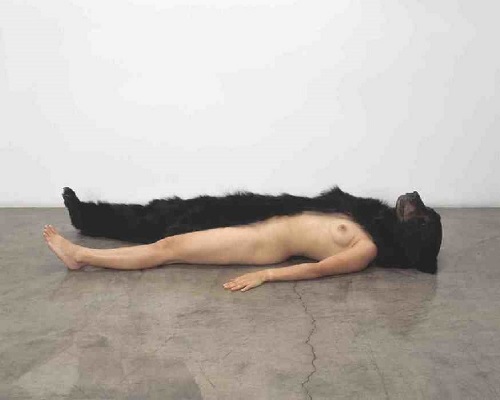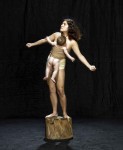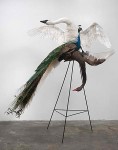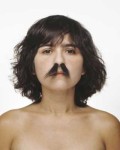


Carlee Fernandez
American, 1973-
Bear Head, Arm and Leg Study I, 2004
c - print , edition of 3, 2 APs
40 x 32 in.

Bear Hair Study by Carlee Fernandez. C-Print, 2004. Courtesy of the artist and ACME
"Taxidermy is simply a hollow form hidden under a wrapper of fur. Cutting open the form, I was interested in exposing the negative space of the taxidermic animal and somehow filling it." - Carlee Fernandez
COMMENTS
A cheeky self-portrait photograph by Carlee Fernandez shows her assuming the guise of a devotional statue of a secular saint. The work is like a smart, even inspired outtake from the Laguna Beach Pageant of the Masters.
Nude from the waist up and perched atop a wooden stump in a classical contrapposto posture, weight borne on one foot with her body slightly twisted and her dreamy gaze directed skyward, Fernandez holds her arms wide with her fists tightly closed. It's the gesture of a martyr, familiar from all manner of Christian death scenes.
This particular image of worldly suffering is characterized by an aura that registers somewhere between casual determination and defiant strength. There's a twist: A baby, strapped tightly to Fernandez's torso with swaddling, mimics her wide-armed pose. Like mother, like son -- but with that pose of maternal martyrdom a double-edged question.
For her first solo show with ACME (and her fifth in L.A.), the artist has conceived a subtly complex image of mother and child that is neither as mawkishly effusive nor as grandiose as it might have been. Instead, its testimony of pain, rapture, refuge and release ricochets around the thoroughly ordinary miracle of birth and motherhood.
Death has never been far from Fernandez's work. She has been making sculptures from taxidermy animals for more than a decade -- a grazing goat merged with a suitcase, for example, or a white laboratory rat mutating into a bunch of red plastic grapes. Most of her recent work here is in that vein. She has stepped up the game, however, providing her strongest show yet.
Fernandez "To Xavier, I Love You" is a spectacular midair collision among a pair of flapping swans and two peacocks. The birds have multifarious meanings in Western culture, starting with Greek mythology and including numerous prophetic literary associations. Leda's seduction by Zeus in the guise of a swan or Juno's sacred peacock might be a deep memory embedded in the work; but here the visual merger of exotic beauty with explosive entanglement is enough.
For the 6-foot-tall sculpture Fernandez has entwined the taxidermy creatures atop a tall wire tripod, like a feathered fireworks display. The baroque formation is both erotic and violent, all splayed wings, heaving bodies and sinuous necks. The peacock tails, one white and the other iridescent blue-green, cascade to the floor.
Look closely at the tumult, and a small, preternaturally serene blue-gray parrot is nestled near the center of the big colliding birds, its little coral-colored beak pressed up against the shockingly intense feathers of the peacock's throat. Even the work's chromatic arrangement bounces between seductive and overwhelming -- something almost too much bear, but still impossible to ignore.
The title "To Xavier, I Love You" -- a mash-note to the artist's newborn -- may explain it. On one level the sculpture is a regal monogram in three ecstatic dimensions, a big "X" of nominal stuffed animals to mark an important event. On another it's an expression of unbridled, unembarrassed awe.
The show features three other obvious taxidermy ensembles. One is a pair of stacked bobcats with an exotic plant growing from the top cat's back. Another delicately drapes a row of nine green and gold parakeets over a brown cord suspended between redwood limbs. A third offers a coyote frozen in mid-leap, the space between his body and the floor filled in with a bronze spider web.
All three mix reverence for the natural world with art's imaginative wildness, trading conceptual places in unexpected ways. Like a latter-day Aesop, Fernandez offers animal fables whose quotient of moral education is directed squarely at the inescapable value of absurd imagination.
A fourth, less obvious bit of taxidermy is, together with the large bird sculpture, the most surprising of the ensemble. Suspended from the ceiling by heavy copper wire, 20 or 30 big chunks of coral are held in elegant bondage, wrapped in yards upon yards of tasseled green and gold thread. Evoking a Victorian chandelier in a Venetian palace as imagined by Whistler, the sculpture, titled "Hanging Lily Pads," is at once poignant in its mortal material and consoling in its beauty.
- Christopher Knight, Art review: Carlee Fernandez @ ACME Gallery, Los Angeles Times, September 30, 2010
http://latimesblogs.latimes.com/culturemonster/2010/09/art-review-carlee-fernandez-acme-gallery.html
